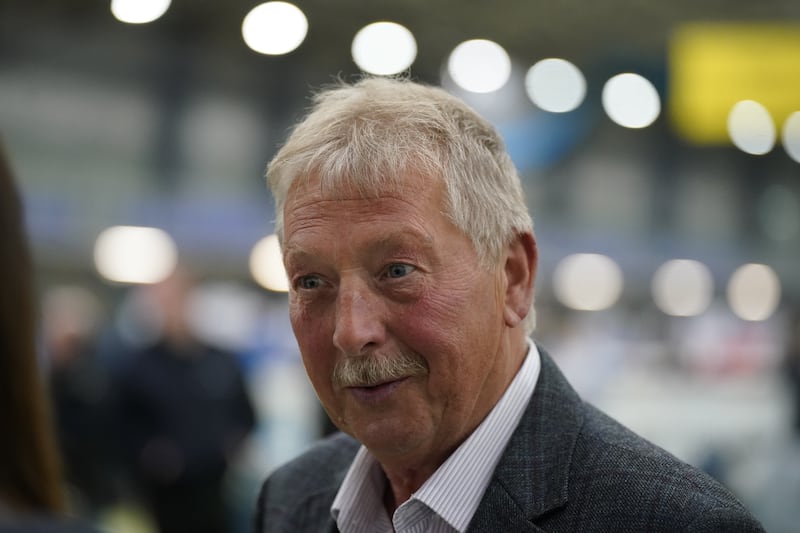BACK in the summer of 2018 I was contacted by representatives of the Martin McGuinness Peace Foundation, established to promote his contribution to peace and reconciliation nationally and internationally through a programme of education, sport, debate, art and culture.
Sitting on the city's walls, adjacent to First Derry, my heart started to race as I listened to a request from the Peace Foundation's board of directors to hold a major reconciliation event in the church.
The next day, a Sunday, I met with a dozen elders after the service to inform them of this quite unpredicted request and to gauge reaction. After a lengthy and, at times, difficult discussion, a majority of the elders consented to grant use of the church to the Peace Foundation.
I recall being excited by the prospect of republicans and unionists meeting in the same sacred space. No, I wasn't dreaming. This was for real and almost too good to be true.
Aware, however, that such an event would not be everyone's cup of tea I chose not to lose the run of myself. Nonetheless, I firmly believed an event in a church, of all places, would bear fruit. Moreover, it would signal that it was no longer business as usual.
This was an opportunity to press new buttons by doing something different. Presbyterians and republicans gathering in a Protestant church was nothing short of miraculous. One small step along the way to a shared future for all.
The unexpected arrival of the Covid pandemic delayed the event, which finally took place at the end of October. Unsurprisingly there were objections.
But the die had been cast and there was no turning back. President Andrew Jackson once said, "Take time to deliberate but when the time for action arrives, stop thinking and go in" - which is precisely what we did.
The audience on the night was nicely mixed. People from both traditions were occupying pews in the church that reopened, free of debt, in 2011, thanks largely to Martin who succeeded in securing close to £2 million to cover the cost of extensive refurbishment.
Conversations, muffled by mandatory face coverings, stopped suddenly as the strains of Danny Boy rang out around the church. What a beginning. Nothing could have been more appropriate to launch this totally unprecedented event.
An untravelled road was opening up before our eyes. Perhaps the time had come to contemplate veering off the narrow ground, that separates one tradition in Northern Ireland from the other and for us to move towards common ground where together we could muster the courage to be the change we desperately desire to see.
An innovative attempt at ramping up reconciliation was enriched by the attendance of college students. More than anything, Martin wanted the young, growing up in cities towns and villages across the country, to have a future different to his past.
Two students, one from Foyle College in the Waterside and the other from St Cecilia's College in Creggan, stimulated the audience with their words as did Martin's granddaughter with her singing.
Their intentional involvement at this bridge-building event served to illustrate the pivotal role history is giving to a rising generation who can help lead us toward a new age of togetherness.
One of Washington's most influential figures, Congressman Richard Neal, was chosen by the Peace Foundation as keynote speaker. Renowned for his ability to deliver the facts, he captivated hearts and minds as he delivered, albeit virtually, a résumé of his friend Martin McGuinness, who took an unparalleled path to peace and was a critical part of changing the course of history in Northern Ireland.
The former IRA commander, who progressively transitioned to become peace-maker extraordinaire, knew, despite his readiness to reach out the hand of friendship, there were many more hills to climb.
One of the last things he shared with me as we quietly chatted in the ICU ward at Altnagelvin hospital was: "David, there is still more work to do."
Truer words have scarcely been spoken. Bottom line, we are now the ones who must reach higher and travel further accepting, as Martin did, there are people of goodwill who are Protestant, unionist and loyalist just as there are people of goodwill who are Catholic, nationalist and republican.
While one swallow will never make a summer, that is no reason for letting the grass grow under our feet. Courageous initiatives that bring different creeds and cultures to meet and mix, laugh and learn, such as the Derry Meeting House model, must become top priority across the country.
James Conant, the first US ambassador to West Germany famously said, "behold the turtle makes progress only when he sticks out his neck".
Sometimes it takes a big step, such as the one taken recently by Presbyterians and republicans in Derry-Londonderry, to show us that a new life and a new mould can be shaped.
An enduring message emerging from this bespoke evening of reconciliation is, "humanity has done hard things before: we can do hard things now".
The time is therefore ripe to start thinking, not just of ourselves but of generations yet unborn and to gird ourselves for the marathon that will be needed to make this place the best place on earth to live in.
Rev David Latimer is the retired minister of First Derry Presbyterian Church and author of A Leap of Faith: How Martin McGuinness and I Worked Together for Peace.







